Insights into signal processing @ ECE Department
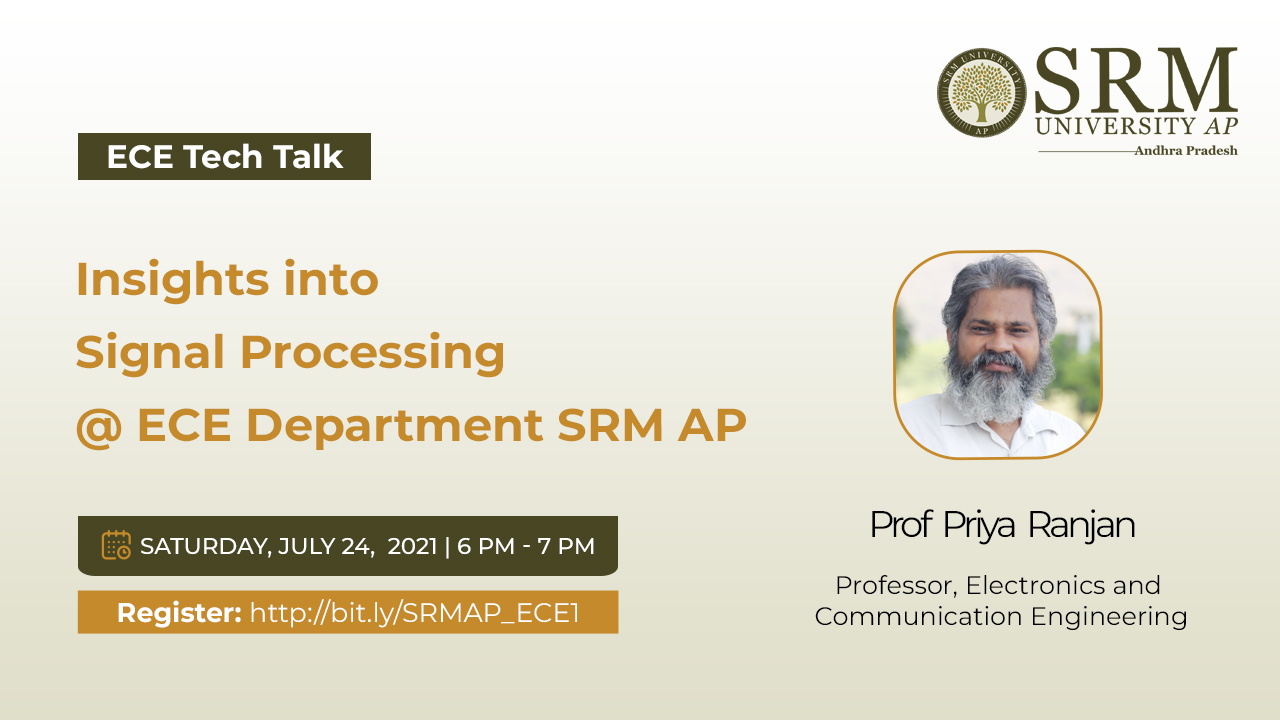 The Department of Electrical and Communication Engineering at SRM University-AP is organising a webinar session on the topic “Insights into Signal Processing @ ECE Department SRM AP” on July 24, 2021, Saturday, at 6.00 pm. Prof Priya Ranjan from the department will elucidate on the topic via the zoom platform.
The Department of Electrical and Communication Engineering at SRM University-AP is organising a webinar session on the topic “Insights into Signal Processing @ ECE Department SRM AP” on July 24, 2021, Saturday, at 6.00 pm. Prof Priya Ranjan from the department will elucidate on the topic via the zoom platform.
Signal processing is a widely used technology that pervades every aspect of our lives. Signal describes how some physical quantity varies over time or space for example sound pressure, radio/television broadcast, movies, electrocardiogram etc. Signal processing is a subfield of electrical engineering that involves manipulating a signal to change the basic characteristics of a signal or to extract some information from it. This is performed by computers, special purpose integrated circuits or Analog electrical circuits.
To know more about analysing, modifying, and synthesising signals with the Department of ECE, join this invigorative webinar on July 24, 2021, from 6.00 pm onwards.
Register here: //srmap.zoom.us/webinar/register/WN_8KLpAUpgRZiWnL9U6AimjQ
- Published in Departmental Events, ECE Events, Events
New materials for energy and information storage and transmission
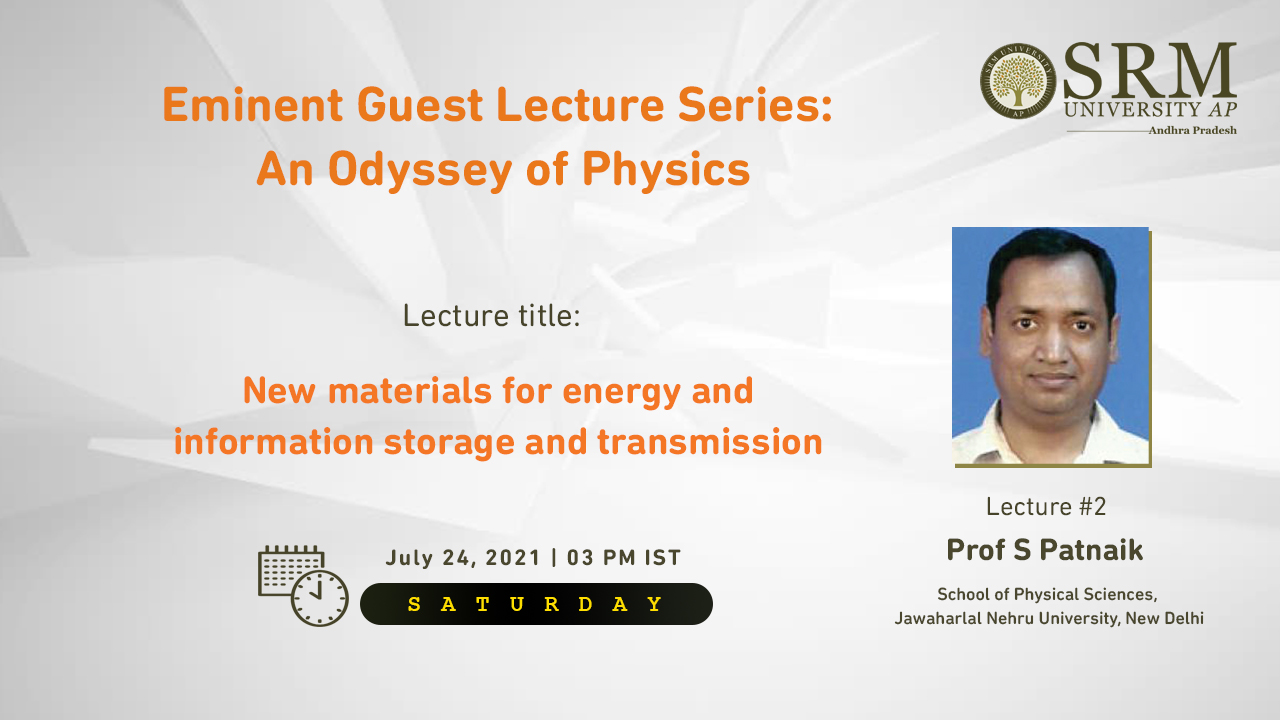 The Department of Physics at SRM University-AP is organising the second edition of the Eminent Guest Lecture Series: An Odyssey of Physics on July 24, 2021, Saturday at 3.00 pm. The session will be engaged by Prof S Patnaik from the School of Physical Sciences in Jawaharlal Nehru University, New Delhi on the subject “New Materials for Energy and Information Storage and Transmission”. Prof. V S Rao, Vice-Chancellor; Prof. D. Narayana Rao, Pro-Vice-Chancellor; Prof. C Durga Rao, Associate Dean, SLASS; Prof. Ranjit Thapa; Prof. Amit Chakraborty; and Prof. Pranab Mandal from the Department of Physics at SRM University-AP will be the panellists for the session.
The Department of Physics at SRM University-AP is organising the second edition of the Eminent Guest Lecture Series: An Odyssey of Physics on July 24, 2021, Saturday at 3.00 pm. The session will be engaged by Prof S Patnaik from the School of Physical Sciences in Jawaharlal Nehru University, New Delhi on the subject “New Materials for Energy and Information Storage and Transmission”. Prof. V S Rao, Vice-Chancellor; Prof. D. Narayana Rao, Pro-Vice-Chancellor; Prof. C Durga Rao, Associate Dean, SLASS; Prof. Ranjit Thapa; Prof. Amit Chakraborty; and Prof. Pranab Mandal from the Department of Physics at SRM University-AP will be the panellists for the session.
Abstract:
The discovery of Dirac and Weyl semimetals (WSM) has brought forth the condensed-matter realization of Dirac/Weyl fermions, which were previously theorised as low energy excitations in high energy particle physics. In the recent past, we have witnessed some exceptional developments in chalcogenide and pnictide materials that have been identified with such properties. Several age-old industrial materials based on selenides, tellurides, borides and oxides have come to the fore that promise to usher in a new understanding of correlated electronic systems. Towards material implementation of quantum computation, we shall review the electromagnetic properties of topological superconductor SrxBi2Se3 and study its pairing mechanism. Several transition metal mono-pnictides are under intense investigation for understanding the properties of inversion-symmetry broken Weyl semimetals. Non-trivial Berry phase and chirality are important markers for characterizing topological aspects of Weyl semimetals. We shall discuss aspects of exceptional magneto-resistance seen in the normal state of these topological semimetals. In specific, we shall summarize potential applications with regard to material properties of the following systems a) Single-stage cryocooled superconducting magnets for MRI (MgB2), b) Cables for lossless energy transmission and storage (Bi2Sr2Ca2Cu3O10), c) Materials to implement Quantum Computation (Sr intercalated Bi2Se3), d) Better read-heads for magnetic storage devices (NbP, TaSb2), e) Magnetic Nano-particles for Cancer therapy (Co+CoO EB), f) Thermoelectric materials for waste heat scavenging (ZrNiPb), g) Next-generation piezo devices using multiferroic materials. (Y2CoMnO6) and h) new ideas on solar energy and battery applications.
About the Speaker:
Dr S Patnaik is a distinguished professor at the School of Physical Sciences at Jawaharlal Nehru University (JNU), New Delhi. He has more than 16 years of experience in the field of research and academics. Dr Patnaik has over 5000 citations for published works. He has international collaborations with the University of Wisconsin-Madison, USA, Université Paris Sud, Orsay, France, University of Cambridge, Cambridge, UK and Institute of Physics, Chinese Academy of Sciences, Beijing. Dr Patnaik’s areas of interest or specialisation are Experimental Condensed Matter Physics, Superconductivity, Mutiferroics and Thermoelectric materials.
Join this educative lecture session on July 24, 2021, at 3.00 pm.
Register here:https://srmap.zoom.us/webinar/register/WN_zEhuvRipRNSafZtxv3Jstg
- Published in Departmental Events, Events, Physics
Let’s crack the GATE
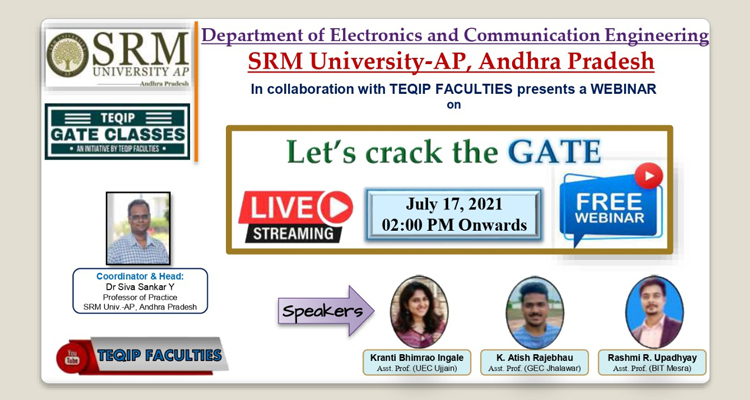 The Department of Electrical and Communications Engineering in collaboration with TEQUIP FACULTIES presents a workshop for GATE aspirants, titled “Let’s crack the GATE” on July 17, 2021, Saturday, at 2.00 pm. Experienced guest speakers namely, Kranti Ingle, Assistant Professor in UEC Ujjain; Atish Katkar, Assistant Professor in GEC Jhalawar; and Rashmi Rathi Upadhyay, Assistant Professor in BIT Mesra will be the trainers of the session. Dr Siva Sankar Y, Professor of Practice from the Department of ECE at SRM University-AP will coordinate the session.
The Department of Electrical and Communications Engineering in collaboration with TEQUIP FACULTIES presents a workshop for GATE aspirants, titled “Let’s crack the GATE” on July 17, 2021, Saturday, at 2.00 pm. Experienced guest speakers namely, Kranti Ingle, Assistant Professor in UEC Ujjain; Atish Katkar, Assistant Professor in GEC Jhalawar; and Rashmi Rathi Upadhyay, Assistant Professor in BIT Mesra will be the trainers of the session. Dr Siva Sankar Y, Professor of Practice from the Department of ECE at SRM University-AP will coordinate the session.
Graduate Aptitude Test in Engineering (GATE) is the gateway for admission into the Masters Program and Job in Public Sector Companies. It is a national level examination that tests the comprehensive understanding of various undergraduate subjects in engineering and science. GATE is conducted jointly by the Indian Institute of Science (IISc) Bangalore and seven Indian Institutes of Technology (IITs) at Bombay, Delhi, Guwahati, Kanpur, Kharagpur, Madras and Roorkee on behalf of the National Coordination Board (NCB)-GATE, Department of Higher Education, Ministry of Education (MoE), Government of India.
All prudent BTech students preparing for GATE are invited to attend this workshop on July 17, 2021, at 2.00 pm to know more about this Computer Based Test (CBT) that has a crucial role in the life of an engineering graduate.
- Published in Departmental Events, ECE Events, Events, Workshop
An Informative Webinar on Choosing BSc (Hons) Integrative Biology at SRM-AP and its Prospective Career Options
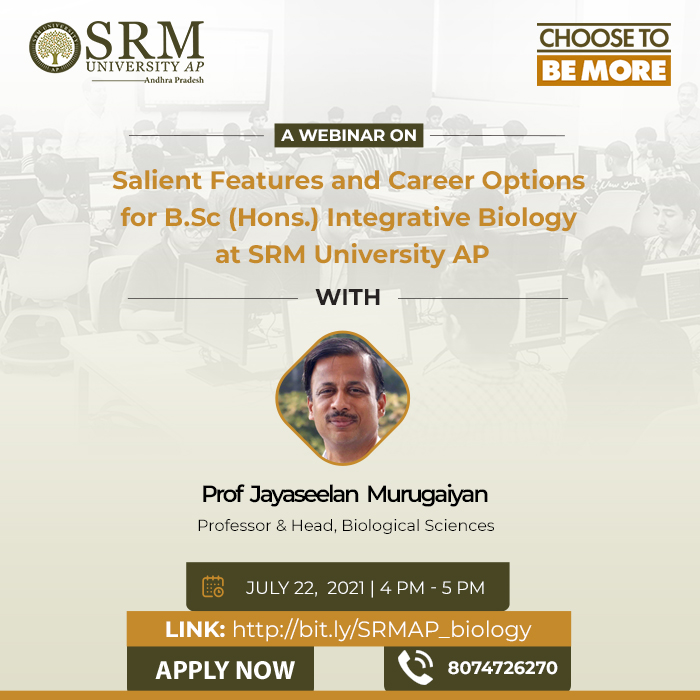 SRM University-AP has begun a series of Webinars to introduce its departments and courses to aspiring applicants of the undergraduate degree programmes. Different departments are presenting interactive sessions to provide an overview of their respective courses and additional resources that SRM University-AP students have access to during their academic years. The Department of Biological Sciences hosts a similar seminar to enlighten enthusiastic students with an overview of the BSc (Hons) in Integrative Biology and the career options associated with it. Prof Jayaseelan Murugaiyan, Head of the Department of Biological Sciences, will educate the audience with an in-depth discussion on the subject and why it will be beneficial to pursue the BSc in Integrative Biology from SRM University-AP. The session is on July 22, 2021, at 4:00 p.m.
SRM University-AP has begun a series of Webinars to introduce its departments and courses to aspiring applicants of the undergraduate degree programmes. Different departments are presenting interactive sessions to provide an overview of their respective courses and additional resources that SRM University-AP students have access to during their academic years. The Department of Biological Sciences hosts a similar seminar to enlighten enthusiastic students with an overview of the BSc (Hons) in Integrative Biology and the career options associated with it. Prof Jayaseelan Murugaiyan, Head of the Department of Biological Sciences, will educate the audience with an in-depth discussion on the subject and why it will be beneficial to pursue the BSc in Integrative Biology from SRM University-AP. The session is on July 22, 2021, at 4:00 p.m.
The series primarily aims to provide candidates with information about the department, courses, and unlimited prospects to explore at SRM University-AP, Andhra Pradesh. Prof Jayaseelan Murugaiyan is a senior scientist and subject matter expert who previously worked as the Scientist & Group Leader (Proteomics) at the Institute of Animal Hygiene and Environmental Health, Center for Infectious Medicine, Freie Universität Berlin, Germany. He taught at many national institutes and an international institute, Germany’s Freie Universitaet-Dhalem Berlin’s Research School of Biomedical Sciences. He is the author of almost 50 papers in biological sciences and studies. To obtain detailed information about the BSc in Integrative Biology programme, you must attend the informative session on July 22, 2021, at 4:00 p.m.
Registrar:https://srmap.zoom.us/webinar/register/WN_7hOTb4LTTiO6Ra62VZMGzw
- Published in Admission Events - Domestic, Biology Events, Events
Why is SRM University-AP the best place for BSc Economics?
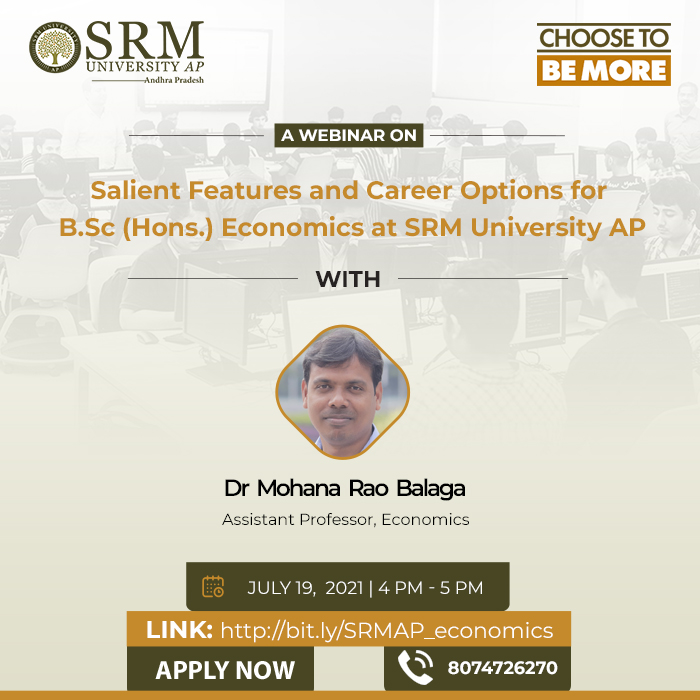 The Department of Economics is hosting a webinar on “Salient Features and Career Opportunities for BSc (Hons) Economics at SRM University AP” on July 19, 2021, at 4.00 pm to discuss the thrust areas of Economics. Dr Balaga Mohana Rao, Assistant Professor in the department, will introduce students to the theoretical and analytical foundations of economics careers.
The Department of Economics is hosting a webinar on “Salient Features and Career Opportunities for BSc (Hons) Economics at SRM University AP” on July 19, 2021, at 4.00 pm to discuss the thrust areas of Economics. Dr Balaga Mohana Rao, Assistant Professor in the department, will introduce students to the theoretical and analytical foundations of economics careers.
In the webinar, Dr Balaga Mohana Rao will detail the industries and job roles available for graduates and discuss the best ways to attain internships and jobs in the industry. Students who choose to pursue a BSc in Economics at SRM University-AP participate in a three-year full-time programme that aims to impart global standards-based curriculum. The objective of the programme is to develop a class of economists who are proficient not just in theory but also in practical expertise to address and analyse real-world problems.
Attend this informative session on July 19, 2021, at 4.00 pm to learn more about the courses, subjects, syllabus, scope, and career opportunities of the BSc Economics course offered in SRM University-AP.
Register here:https://srmap.zoom.us/webinar/register/WN_rYy5kmJvQ6aTJDR73i_-vw
Insights into communication systems @ ECE Department
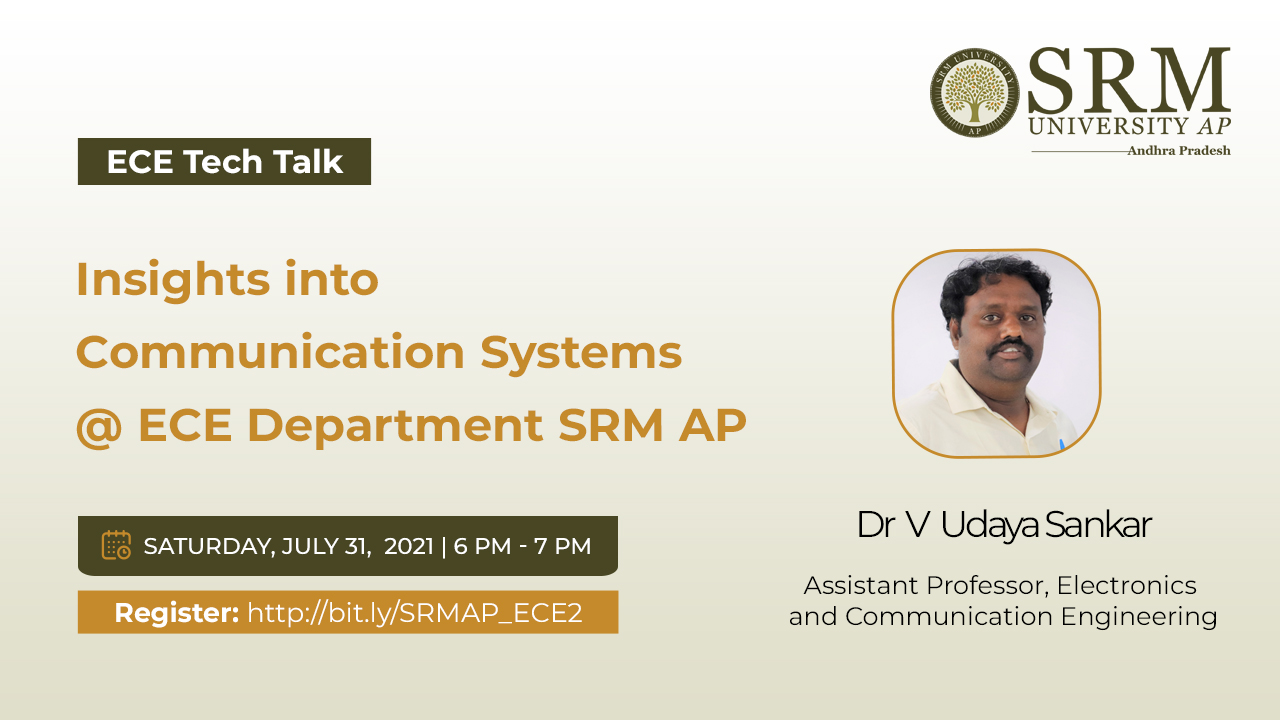 The Department of Electrical and Communication Engineering (ECE) at SRM University-AP is organising a webinar session on the topic “Insights into Communication Systems @ ECE Department SRM AP” on July 31, 2021, Saturday, at 6.00 pm. Dr V Udaya Sankar, Assistant Professor from the department will elucidate on the topic via the Zoom platform.
The Department of Electrical and Communication Engineering (ECE) at SRM University-AP is organising a webinar session on the topic “Insights into Communication Systems @ ECE Department SRM AP” on July 31, 2021, Saturday, at 6.00 pm. Dr V Udaya Sankar, Assistant Professor from the department will elucidate on the topic via the Zoom platform.
The Department of ECE fosters Future Communication Systems (FCS) research group which is actively involved in the theoretical and practical facets of communications systems and networks. The impact of such systems is of greater importance in the information-driven world in both the near and long term future. This research group spans the various aspects of communication & information theory, wireless communications, signal and image processing, wireless sensor networks, vehicular communications, Artificial Intelligence & machine learning, game theory & optimization, IoT etc.
Join this engaging webinar on July 31, 2021, to know more about the ECE department at SRM University-AP that focuses on applying the theoretical concepts to the practical applications in cellular communications, defence, satellite, consumer electronics, health care, remote sensing and the environment.
Register here: https://srmap.zoom.us/webinar/register/WN_TmwIIaTIRouq1pBlBbjYSA
- Published in Admission Events - Domestic, Departmental Events, ECE Events, Events
CSIR-CCMB chief scientist talks in the Biological Sciences webinar
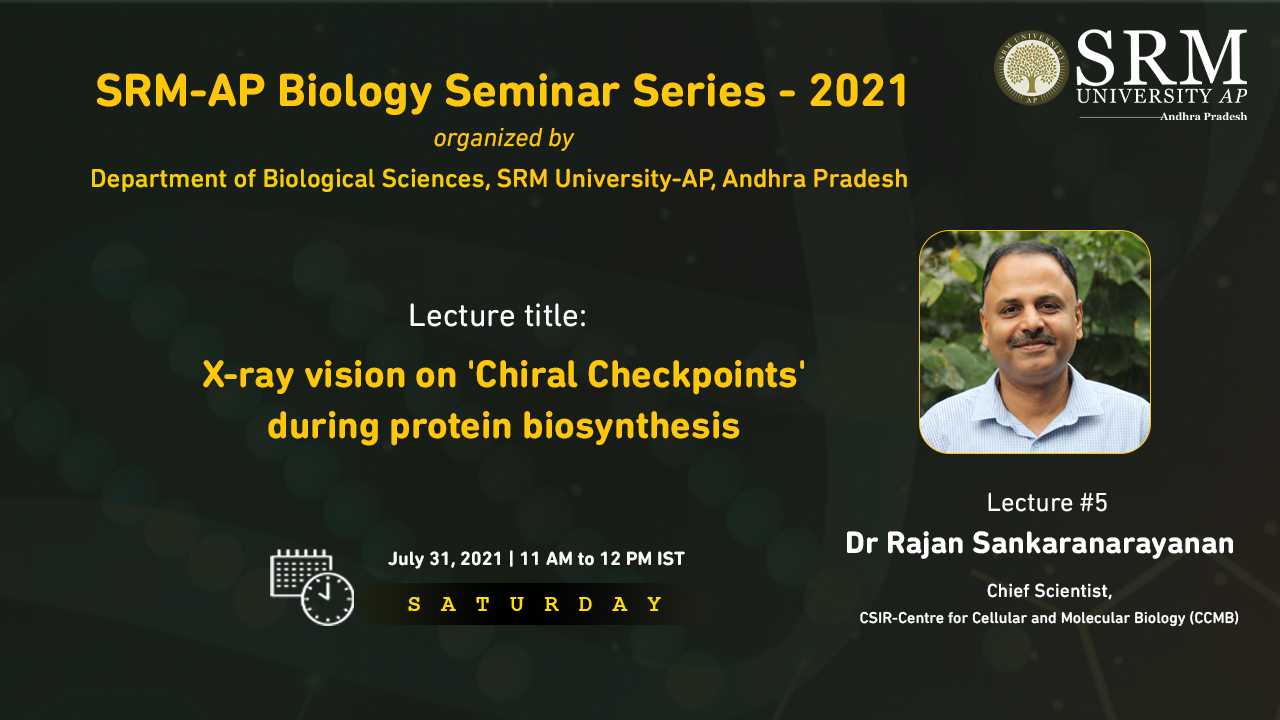 The latest episode of the webinar series conducted by the Department of Biological Sciences in SRM University-AP is scheduled for July 31, 2021, at 11.00 am. Dr Rajan Sankaranarayanan, Chief Scientist at CSIR-Centre for Cellular and Molecular Biology (CCMB) will give a lecture on the topic “X-ray vision on ‘Chiral Checkpoints’ during protein biosynthesis” in the session. Faculty and research scholars from the department will join the speaker on the panel.
The latest episode of the webinar series conducted by the Department of Biological Sciences in SRM University-AP is scheduled for July 31, 2021, at 11.00 am. Dr Rajan Sankaranarayanan, Chief Scientist at CSIR-Centre for Cellular and Molecular Biology (CCMB) will give a lecture on the topic “X-ray vision on ‘Chiral Checkpoints’ during protein biosynthesis” in the session. Faculty and research scholars from the department will join the speaker on the panel.
Protein chains contain only l-amino acids, with the exception of the achiral glycine, making the chains homochiral. This homochirality is a prerequisite for proper protein folding and, hence, normal cellular function. As a scientist, Dr Sankaranarayanan comprehensively reviews d-amino acids with respect to their occurrence and physiological roles, implications for chiral checkpoints required for translation fidelity, and potential use in synthetic biology. He has co-authored and published a research paper titled “Chiral checkpoints during protein biosynthesis” in the “Journal of Biological Chemistry”.
Read the full paper here:https://doi.org/10.1074/jbc.rev119.008166
About the Speaker:
Dr Rajan Sankaranarayanan obtained Bachelors and Masters in Physics from Madurai Kamaraj University and his PhD from the Molecular Biophysics Unit, Indian Institute of Science, Bangalore in 1996. He was a postdoctoral research fellow at IGBMC, Strasbourg, France from 1996-2002. Dr Sankaranarayanan, after returning to India in 2002, has set up a state-of-the-art macromolecular crystallography laboratory and is carrying out research in the field of Structural Biology. From CCMB, his group has made outstanding contributions in the area of proofreading during protein biosynthesis. He was awarded the prestigious Wellcome Trust International Senior Research Fellowship, UK in 2003, Swarnajayanthi fellowship of the DST, India in 2005-2006, National Bioscience Award of DBT in 2008, Shanti Swarup Bhatnagar award in 2011, GN Ramachandran Gold Medal in 2015 and Infosys Science Prize in 2020. He is an Associate Editor of Journal of Structural Biology and Board of Reviewing Editor of the journal eLife. He is also a fellow of all the three major science academies of the country.
Join this free informative webinar on July 31, 2021, 11.00 am onwards to gain research insights from the field expert.
Register here:https://srmap.zoom.us/webinar/register/WN_l7rK4UOfTFGFUiHe7W2OMA
- Published in Biology Events, Departmental Events, Events
Queueing theoretic models for wireless multicast systems and power control
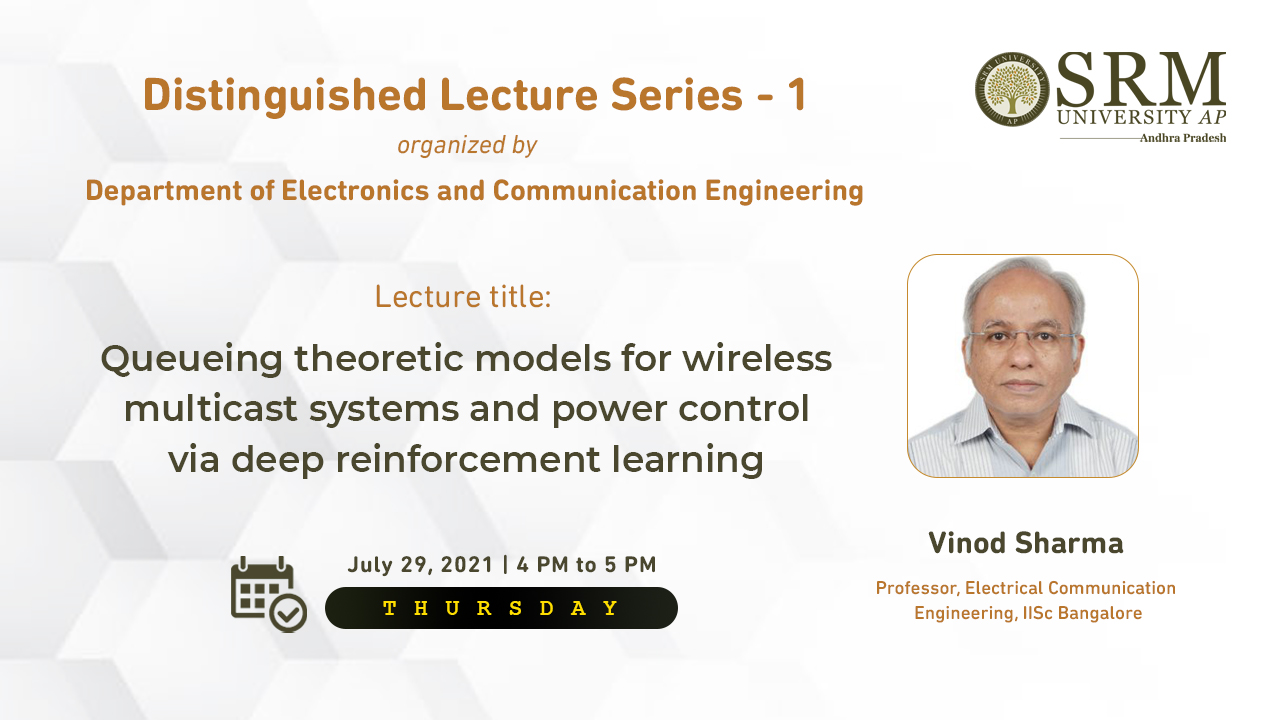 As a part of the departmental Distinguished Lecture Series, the Department of Electronics and Communication Engineering at SRM University-AP is organising the first lecture on the topic “Queueing theoretic models for wireless multicast systems and power control via deep reinforcement learning”. Dr Vinod Sharma, Professor in Electrical Communication Engineering, IISc, Bangalore will be the keynote speaker of the session which will be held on July 29, 2021, at 4.00 pm.
As a part of the departmental Distinguished Lecture Series, the Department of Electronics and Communication Engineering at SRM University-AP is organising the first lecture on the topic “Queueing theoretic models for wireless multicast systems and power control via deep reinforcement learning”. Dr Vinod Sharma, Professor in Electrical Communication Engineering, IISc, Bangalore will be the keynote speaker of the session which will be held on July 29, 2021, at 4.00 pm.
Abstract:
We consider a wireless Base station (BS) transmitting on a downlink to multiple users. The BS has a finite number of files that the users can request. The users may have their own local caches. If a user requests a file and it is not in its cache, the request goes to the BS. This model is the practical scenario of downloading/streaming videos from Netflix. In order to reduce the transmission load on the downlink, we exploit the fact that the downlink is a broadcast channel and multiple users may be requesting the same file. This is accomplished by designing a novel multicast scheme in which all requests at the BS for the same file are merged together and are satisfied by a single transmission from the BS. This simple and natural scheme is shown to provide lower mean sojourn time compared to the currently popular coded caching schemes in literature and is much simpler to implement. We have also theoretically studied this queue and obtained approximate mean sojourn times. Next, we have shown that considering the channel fading can actually wipe out most of the benefits of our multicast scheme. However, we suggest a simple modification to the scheme which restores most of the gains. Furthermore, we show that adaptively changing the transmit power at the BS based on the instantaneous channel gains of the users can further significantly reduce the mean sojourn times. To get optimal power control, we use DQN, a Deep Reinforcement Learning algorithm. It is modified to ensure that the long term power constraint is satisfied and that it tracks the time-varying channel and request statistics.
About the Speaker:
Vinod Sharma completed his B.Tech Electrical Engineering from IIT Delhi, in 1978, PhD in Electrical and Computer Engineering, from Carnegie Mellon University, in 1984. He is Professor in Electrical Communication Engg., IISc, since March 2000. Prior to it, he was Associate Professor in Electrical Engineering, IISc Bangalore. He was Chairman of the Department of Electrical Communication Engineering from July 2007 to November 2011. He was Assistant Professor, Electrical and Communication Engg, Northeastern University; and Visiting Faculty, Electrical Engineering, University of California, Los Angeles. Dr Vinod’s research interests are in the area of Communication and Computer Networks, Wireless Communication, Sensor Networks, Queueing Theory, Information Theory and Statistical Estimation Theory.
Join this free informative webinar on July 29, 2021, from 4.00 pm onwards to gain research insights from the field expert.
Register here:https://srmap.zoom.us/webinar/register/WN_npqiEhMbSZebRzIj_VmRrA
- Published in Departmental Events, ECE Events, Events
Insights into embedded systems @ ECE Department
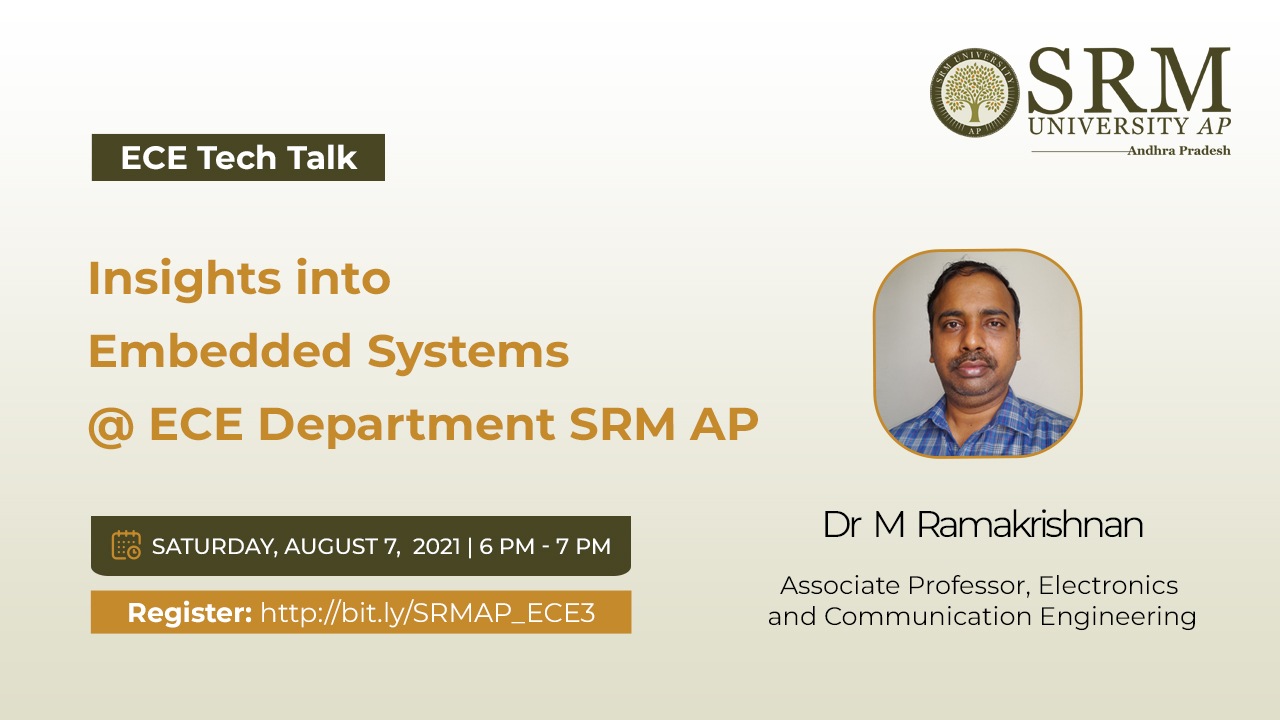 The Department of Electronics and Communications Engineering (ECE) at SRM University-AP is conducting a webinar on the topic “Insights into embedded systems @ ECE Department SRM AP” on August 07, 2021, at 6.00 pm. Dr M Ramakrishnan, Assistant Professor in the Department of ECE will deliver a captivating lecture and enlighten the virtual gathering on the topic. (more…)
The Department of Electronics and Communications Engineering (ECE) at SRM University-AP is conducting a webinar on the topic “Insights into embedded systems @ ECE Department SRM AP” on August 07, 2021, at 6.00 pm. Dr M Ramakrishnan, Assistant Professor in the Department of ECE will deliver a captivating lecture and enlighten the virtual gathering on the topic. (more…)
- Published in Admission Events - Domestic, Departmental Events, ECE Events, Events
Insights into VLSI Design @ ECE Department
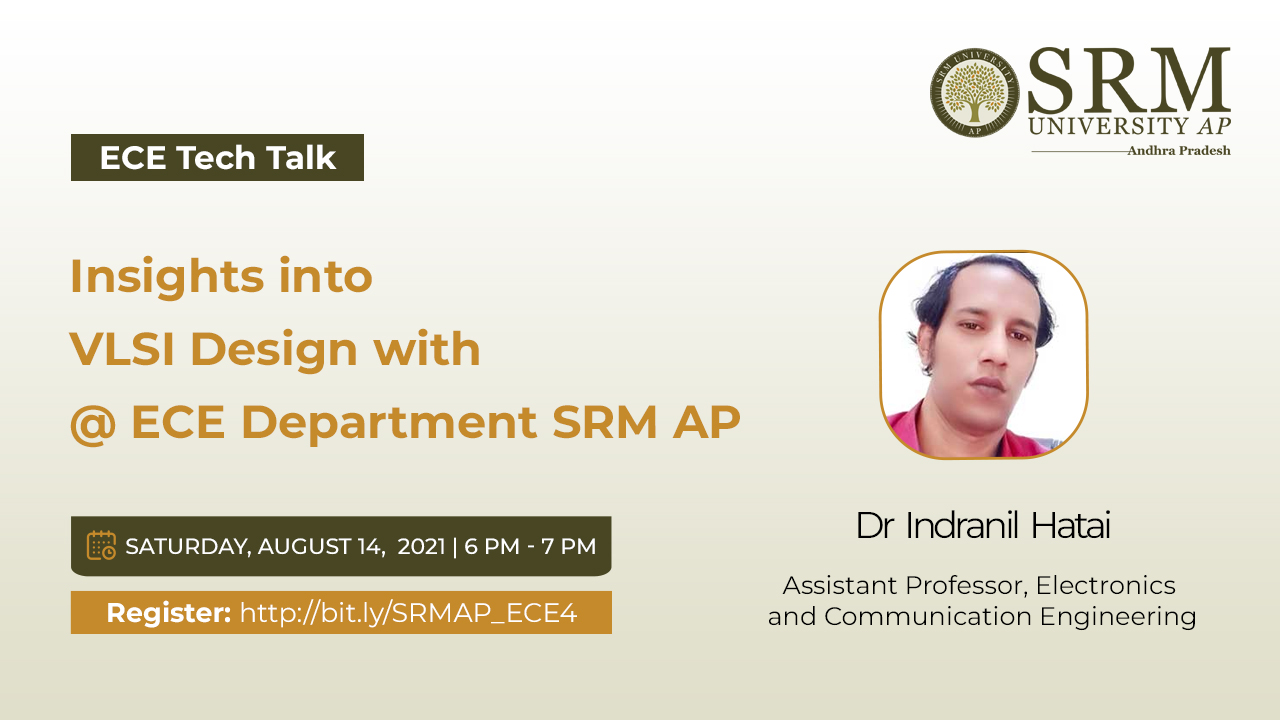 The Department of Electrical and Communication Engineering (ECE) at SRM University-AP is organising a webinar session on the topic “Insights into VLSI Design @ ECE Department SRM AP” on August 14, 2021, Saturday, at 6.00 pm. Dr Indranil Hatai, Assistant Professor from the department will elucidate on the topic via the Zoom platform.
The Department of Electrical and Communication Engineering (ECE) at SRM University-AP is organising a webinar session on the topic “Insights into VLSI Design @ ECE Department SRM AP” on August 14, 2021, Saturday, at 6.00 pm. Dr Indranil Hatai, Assistant Professor from the department will elucidate on the topic via the Zoom platform.
Very-large-scale integration (VLSI) is the process of creating an integrated circuit (IC) by combining thousands of transistors into a single chip. Before the introduction of VLSI technology, most ICs had a limited set of functions they could perform. An electronic circuit might consist of a CPU, ROM, RAM and other glue logic. VLSI lets IC designers add all of these into one chip. With the advent of very large scale integration (VLSI) designs, the number of applications of integrated circuits (ICs) in high-performance computing, controls, telecommunications, image and video processing, and consumer electronics has been rising at a very fast pace. The current cutting-edge technologies such as high resolution and low bit-rate video and cellular communications provide the end-users with a marvellous amount of applications, processing power and portability. This trend is expected to grow rapidly, with very important implications on VLSI design and systems design.
Join this informative webinar on August 14, 2021, to know more about the ECE department at SRM University-AP that grooms students to the electronics industry that has achieved phenomenal growth due to the rapid advances in large scale integration technologies.
Register here: https://srmap.zoom.us/webinar/register/WN_-3WCmwzlQZGYbwdFfapkHg
- Published in Admission Events - Domestic, Departmental Events, ECE Events, Events

